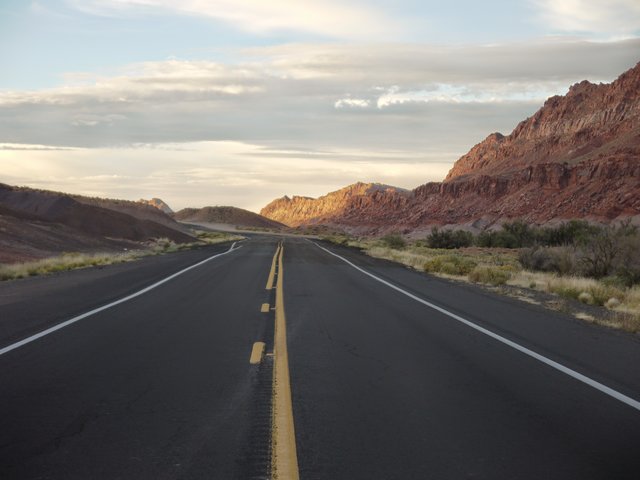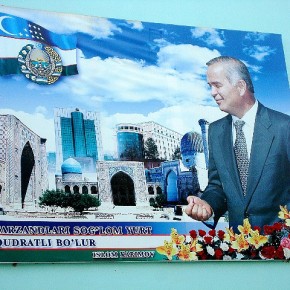Sometimes, you can’t tell how much a book has moved you until many years after you first encounter it. This past October, I took a trip Flagstaff, a town I’d somehow managed not to visit in fourteen years of living in Arizona. After a mostly sleepless night of coughing, I forced myself to drive north towards the Grand Canyon. That’s when I remembered Tony Hillerman.
The fastest way to get to the National Park heads northwest out of town. But I felt a strong need to take the less traveled route, skirting the volcanic San Francisco Peaks to the east instead. I’d been studying the map in the days leading up to my impulsive decision to give myself a short vacation and kept finding myself drawn to the line traced by U.S. 89, which seemed to go out of its way not to get to the point too soon.
Even though it was already the middle of the afternoon, I still felt like I’d just stumbled out of bed with a bad cold. An asthma attack at high altitude will do that to you. Or to me, to be more precise. Part of me had just wanted to sit in a café downtown and sip black coffee — an excellent treatment, because it relaxes the smooth muscles of the lungs even as it tenses the rough ones of the face — until I felt completely human again. When I’d reflected on how difficult it was to get away from my various duties back in Tucson, though, I knew that I wouldn’t forgive myself if I gave up the prospect of sightseeing that easily.
By the time I’d reached the point where the highway crests, the San Francisco Peaks to my right, the excitement of seeing something new was starting to work its magic. While I didn’t feel good, exactly, I had at least stopped compulsively reaching for my inhaler to make sure that I would be ready for another asthma attack. That’s why, as I began the descent, I decided that I should treat myself to a better view than my bug-spattered windshield was currently providing.
Pulling off to the side of the road at the first safe opportunity, I grabbed the wipes I’d brought with me for precisely this purpose and got out of my vehicle. As I began working on the glass, though, a stiff wind picked up. Realizing too late that my parking slot sloped downward towards the passenger side, I watched the door I’d left open blow shut. And that’s when I recalled, with sickening finality, that General Motors cars of my Pontiac Aztek’s vintage make it far too simple for drivers to lock themselves out.
My predicament would have been frustrating in the middle of a city. But out on this already-lonely stretch of highway, some twenty-five miles north of Flagstaff, it felt a lot more significant. I had already been worrying that my late start would make me lose the light before I reached my destination. Now I was legitimately concerned that I would lose it before help arrived.
This is where Tony Hillerman comes in. As I took in the surrounding landscape, with the sun starting to drop behind the San Francisco Peak to the southwest and miles of iconic canyon country stretching out ahead to the north and the northeast, my initial panic turned to bemusement. Rather than lament the fact that I had managed to lock myself out of my vehicle in a remote location, far from the help I needed, I took as deep a breath as I could muster and concluded that, if I was going to be spending hours alone somewhere, this was a beautiful place to do it. And I remembered, all of a sudden, fleeting impressions from Hillerman’s 1982 novel The Dark Wind.
When I was in high school, I always read the book reviews in The New York Times and The Washington Post, even though I struggled to sustain the focus to read actual books. I had a vague sense — which ultimately turned out to be prescient — that I was storing up information for a day when I would be able to make productive use of it. Although I had never read any detective fiction, I made note of the very favourable reviews that Tony Hillerman was receiving for his novels and decided that, if I ever did become interested in the genre, I would make a point of checking his work out.
A decade later, now in the process of getting a Ph.D. in English, I found myself in the public library of Vallejo, California, where I was currently living, looking for audiobooks that my girlfriend and I could listen to on the long roadtrip we planned to take as soon as my qualifying exams were over. I had gotten the inspiration to use abridged audiobooks to help me study, since I figured — rightly, as it turned out — that I would remember texts better if I experienced them with as many senses as possible. In the course of listening to them, I’d been struck by how alert I stayed, and decided that a story with a strong plot would do wonders to make those potentially sleepy-eyed moments behind the wheel safer.
Unfortunately, most of the library’s titles were drawn from the sort of bestsellers in which neither my girlfriend or I had any interest in reading. I was getting ready to abandon my plan when I came across The Dark Wind in an unabridged edition stretching over many cassettes. Something clicked in my mind and I knew that finally experiencing Tony Hillerman’s work would be the best way to spend those hours on the road when we wanted a break from music or needed a little assistance staying mentally focused.
Listening to a novel while driving unfamiliar highways had a peculiar effect on me. Or maybe it was just that the kind of novel I’d chosen did, because, like all of Tony Hillerman’s novels set on and around the Navajo Nation, The Dark Wind includes extended descriptions of landscape and lots of driving. Whatever the reason, I found that particular passages from the novel would stick in my memory with the places where I heard them.
I recall one leg of our three-week roadtrip with particular clarity. We had left Chicago at 5:30pm with a notion that we wanted to get to Denver as soon as possible, in part because we were getting eager to return home to California and in part because we had learned, by that point, that it made more sense to concentrate our time in places that we wanted to be, rather than wasting it on points in between.
My girlfriend drove the first portion of the journey, through Illinois and Iowa, finally relinquishing the wheel in Lincoln, Nebraska. Exhausted, she soon fell asleep in the passenger seat while I pressed on through the night. Because music would have disturbed her slumber and because it’s harder to remain alert when you’re driving arrow-straight roads for hundreds of miles, I let <em play.
Soon I’d developed a good rhythm. On the lightly traveled U.S. highways we had opted to take, there was basically no traffic in the middle of the night. Every thirty or forty miles the road would go through a small town. I made sure to slow down to a few miles-per-hour below the posted speed limit then, but would floor it as soon as we got out on the open road again. Because the V8-equipped Lincoln Town Car we’d rented has a digital speedometer that wouldn’t give an accurate reading over a certain threshold, I was never quite sure how fast I was going during those stretches. But the time we were making suggested that it was pretty darned fast.
It got to the point where I had the sensation that the pace of the story would pick up whenever the car went faster, though that obviously wasn’t the case. Even now, over two decades later, I can remember the voice of the man who read the audiobook, his dry Western cadence perfectly in tune with Hillerman’s prose. And I have a distinct memory of driving into the dawn during a passage in which the protagonist of The Dark Wind, Navajo tribal policeman Jim Chee, is himself seeing the first light on the mountaintops.
It was that sort of moment that came back to me as I pondered what to do last October. The mysteries in Hillerman’s novels are always engaging when I’m in the middle of reading them. But it’s not the intricate details of who did what to whom and why that stands out in my memory decades later. Nor do the specific rituals of the Navajo, Hopi and Zuni peoples that he takes pains to document. What remains, above all else, is a recollection of the attitude his two detectives, the spiritually inclined Chee and the older, agnostic Joe Leaphorn, adopt towards everything they encounter and the precision with which they observe it.
I just finished rereading The Dark Wind, after recently feeling compelled to read its predecessor People of Darkness from 1980, the novel in which Hillerman first introduced Jim Chee. I wasn’t sure what led me back to his work. Perhaps it was simply that I needed some “comfort food” to sustain me in a very difficult month, as the first anniversary of my mother’s death approached. Sometimes, I just need to immerse myself in the act of reading without worrying about anything else.
What surprised me most, after finishing The Dark Wind this time, is just how little of the plot I could recall and how accurately, by contrast, I remembered those moments when Jim Chee temporarily sets aside his police work to make sure his life isn’t out of balance. Without abandoning the conventions of the detective fiction he grew up on — an investigator at odds with his superiors and bureaucracy more generally, who is convinced that rules are made to be broken — Hillerman manages to turn the novel into an indictment of white man’s tendency to prioritize ends over means, usually with the consequence that what should matter most is brushed aside in the name of efficiency.
As it turned out, I only had to wait an hour and a half for help to arrive on that day last October. I suppose it could have seemed like an eternity if I had been panicking, particularly with my breathing difficulties. Once I’d started thinking about the experience as a kind of reward instead of a punishment, though, the minutes flew by. Instead of worrying about what might happen, I took pleasure in what was happening.
I know that there are reasons to be wary of the impulse to reform the dominant culture by comparing it to one deemed to be more in touch with nature. Goodness knows, the fetishization of both kinds of “Indian” in the late 1960s often amounted to the worst kind of cultural appropriation. But I also think we need to be more open-minded about the potential for such juxtapositions to bring about positive change. Because, quite frankly, it’s a lot worse to not even want to consider alternatives to the status quo than it is to seek them in the worldviews different from one’s own.


